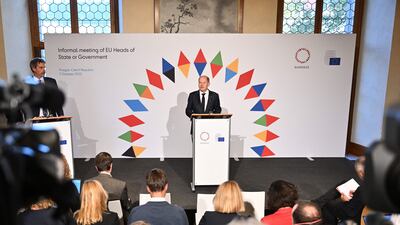The European Union must continue working towards its pledge of climate neutrality by 2050 despite the recent upheavals in energy markets caused by Russia’s invasion of Ukraine, a senior EU official said on Monday.
“We need to make sure that despite all the current pressing issues, we keep working on the Green Deal files,” said the official. “We cannot keep postponing some key decisions and financing of the reforms.”
Negotiations over a gas price cap and reforming Europe’s electricity sector have dominated headlines in the past few months, overshadowing efforts to abide by the European Green Deal, which aims to make the EU climate neutral by 2050.
The bloc’s 27 member states have committed to cut net greenhouse gas emissions by at least 55 per cent by 2030.
But Russia’s invasion of Ukraine has forced the EU to rapidly find alternative fossil fuel suppliers. Soaring inflation and fears of blackouts this winter have weakened its commitments to climate goals, analysts say. German Chancellor Olaf Scholz last month signed new energy deals with several Gulf countries.
Russia supplied the continent with more than 40 per cent of its natural gas imports before the war.
Germany, which had planned to phase-out nuclear power by the end of this year, has reportedly resurrected at least 20 highly polluting coal-fired plants and last month extended the lifespan of two of its last nuclear power stations.
The EU is this week holding informal tripartite meetings between Parliament, the Council and the Commission to discuss legislative proposals regarding climate change. Topics on the agenda include the emissions trading system and waste batteries.
But the discussions are likely to be overshadowed by a meeting on Wednesday of European energy ministers in Brussels, after informal talks last week in Prague during which 44 leaders, including the EU's 27, called for unity in the face of the energy crisis.
Energy ministers are this week expected to discuss controversial topics including a potential gas price cap and how to run a joint liquefied natural gas (LNG) purchasing platform to avoid competition between EU countries as well as with larger markets such as Asia.
Germany, one of the EU’s major players, opposed a gas price cap. Mr Scholz suggested on Friday that Asian countries such as Japan and South Korea should ally with the EU to buy LNG, a proposal that is seen widely as unrealistic in Brussels.
The EU official, who spoke anonymously to discuss sensitive topics, criticised divisions which have slowed down decision-making, saying that politics were getting in the way. “What we’re seeing is very similar to what happened at the beginning of Covid, when countries tried to outbid each other to buy masks,” he said. “We must not repeat mistakes from the past.”
Austria on Monday said it was seeking to enlist other EU countries to oppose calling investment in gas and nuclear power "green".
Vienna filed a legal challenge against the EU's inclusion of the energy sources on a list of climate-friendly investments, highlighting divisions that have hit the bloc during an energy crisis made worse by war in Ukraine.
Luxembourg has already voiced its support for Austria and others may follow, Austrian Environment Minister Leonore Gewessler told a news briefing, without naming the countries.
"I find it irresponsible and unreasonable," she said of the EU's decision. Other countries could join "as supporting parties in the proceedings", she said.


